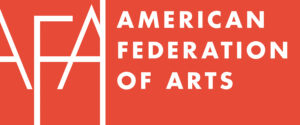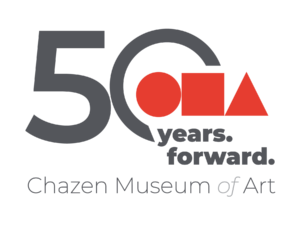Bill Viola has created video work, architectural video installations, sound environments, electronic music performances, and works for television broadcast for over four decades. The Raft (2004), the video installation exhibited here, exemplifies Viola’s powerfully affecting work. Recorded on high-speed 35mm film, the ten-and-a-half-minute long artwork depicts in extreme slow motion a group of people as they are suddenly inundated from both sides by a deluge. In its wake, the group members huddle together, assist those who have fallen, and help one another recover. The video is projected at life-size within the large, darkened gallery and is accompanied by the immersive sound of rushing water.
The title of this artwork references a monumental painting created by French artist Théodore Géricault entitled The Raft of the Médusa (1818–19). Géricault’s painting depicted the aftermath of the wreck of the French ship Médusa on its way to colonize Senegal in 1816. Due to a shortage of lifeboats, most of those on board were left to fend for themselves. They constructed a makeshift raft from the wreckage and subsequently floated aimlessly for thirteen days, during which time they fought one another and engaged in cannibalism, ultimately leaving only ten survivors.
While Géricault’s painting referenced the worst of humanity, and the failing of the French government, Viola’s video installation demonstrates the opposite. The artist has said that in this world of unstable and often unseen powers, an attack can come at any time for seemingly no reason. For him, it is important that everyone in The Raft survives, a statement of humanity’s resilience.
This presentation of Bill Viola: The Raft is organized by the American Federation of Arts (AFA) and Bill Viola Studio. The Raft is part of ArtRoom, an ongoing series of contemporary art installations organized by the AFA.

This presentation is made possible, in part, by funds from the A.R. Brooks Trust.

The Chazen Museum of Art’s 50th anniversary year activities are supported by a grant from the UW–Madison Anonymous Fund, with additional support from the Office of the Chancellor and The Brittingham Trust.